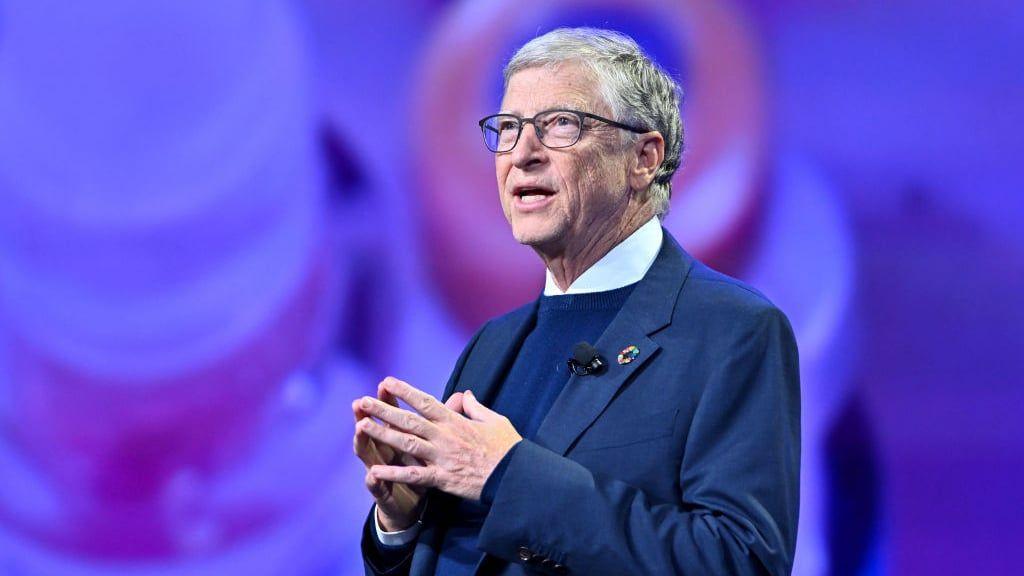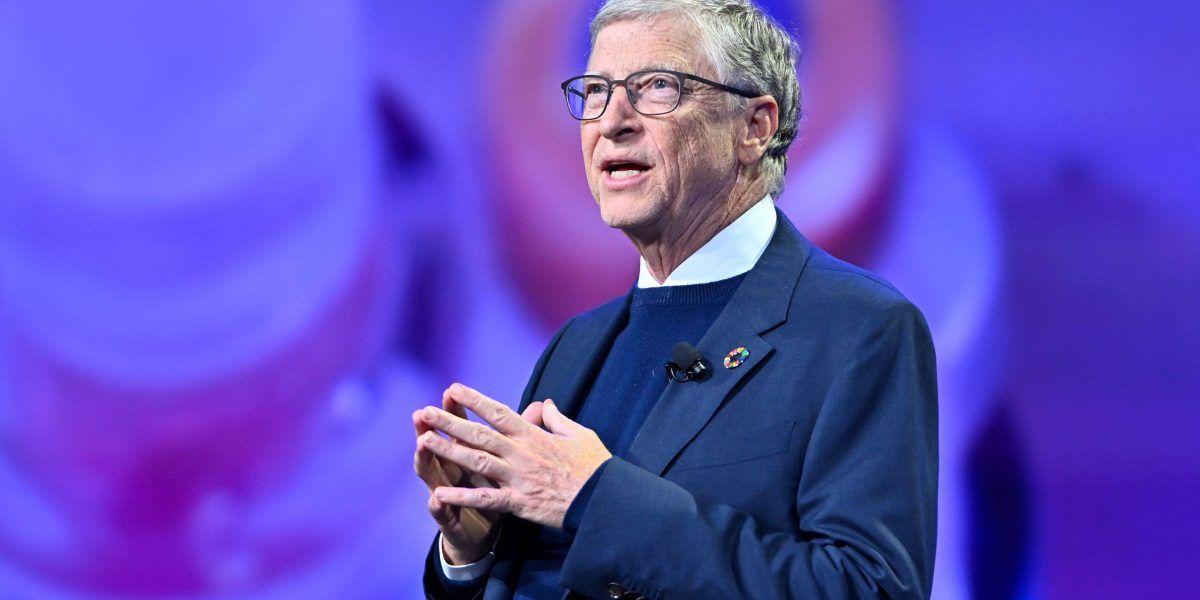Bill Gates' AI Predictions: From Skeptic to Advocate, Foreseeing a Transformative Decade Ahead
2 Sources
2 Sources
[1]
Bill Gates predicted AI's lucrative potential nearly a decade ago -- now it's worth billions: Here's what he saw
Artificial intelligence seems to be everywhere these days, from chatbots to Hollywood movies. Tech giants have poured billions of dollars into AI, and "prompt engineering" is a lucrative, in-demand job. Nearly a decade ago, Bill Gates saw it coming: When asked which industry he would focus on if he had to start over from scratch, the Microsoft co-founder quickly chose the "exciting" field of AI. "The work in artificial intelligence today is at a really profound level," Gates said at a 2017 event at Columbia University alongside Berkshire Hathaway CEO Warren Buffett. At the time, the technology was still years away from its most notable advancements to date, especially generative text and images powered by large language models. Instead, Gates pointed to the "profound milestone" of Google's DeepMind AI lab creating a computer program that could defeat humans at the board game Go. "That kind of technology is in all the leading companies and a lot of universities," said Gates. "With AI, [the] creation of agents, the ability to read and understand material, it is going to be phenomenal. So, anything connected with that, I think, would be an exciting lifetime career." DON'T MISS: The ultimate guide to negotiating a higher salary Even before Gates' comments, companies like Apple, Amazon, Tesla and IBM were years into researching and developing AI models for a variety of potential applications, from virtual personal assistants to self-driving cars. OpenAI, which created ChatGPT, launched in 2015 with a promise of more than $1 billion in funding from investors like Tesla CEO Elon Musk, PayPal co-founder Peter Thiel and LinkedIn co-founder Reid Hoffman. Still, Gates expressed surprise last year at the speed of the technology's progress. He'd challenged OpenAI to create an AI model that could get a top score on a high school AP Biology exam, expecting the task to take two or three years, he wrote in a blog post last year. "They finished it in just a few months," wrote Gates, calling the achievement "the most important advance in technology since the graphical user interface [in 1980]." The rapid development comes with "understandable and valid" concerns, Gates noted. Today's most advanced AI programs remain rife with errors and prone to enabling the spread of falsehoods online, while stoking fears of rendering some people's jobs obsolete. But Gates remains adamant that if he had to start a new business from scratch, he'd launch an "AI-centric" startup, he told CNBC Make It in September. One difference between now and 2017: Any AI company launched today faces much steeper competition. "Today, somebody could raise billions of dollars for a new AI company [that's just] a few sketch ideas," Gates said, adding: "Just believing in AI, that's not very unique. So I would have to develop some unique view of how you design AI systems -- something that other people didn't get."
[2]
Bill Gates: AI Will Build Houses, Run Hotels By 2034 -- Microsoft Co-Founder Once A Skeptic Now Sees Both Promise And Peril
Bill Gates, Microsoft co-founder and longtime artificial intelligence advocate continues to champion AI while acknowledging its unprecedented rapid advancement and potential risks. What Happened: The tech pioneer's journey with AI spans nearly a decade. In 2017, at Columbia University, Gates identified artificial intelligence as his chosen field if starting a career today, citing its "profound" potential, reported CNBC Make It. In April, in an episode of his "Unconfuse Me" podcast featuring OpenAI CEO Sam Altman, Gates admitted his initial skepticism about AI's capabilities was misplaced. "I was very skeptical. I didn't expect ChatGPT to get so good," Gates said. Gates particularly noted AI's surprising impact on white-collar work, contrary to earlier expectations. During Wednesday's "Possible" podcast with Reid Hoffman and Aria Finger, he projected that AI robots would expand into construction sites and hotels within ten years. See Also: Tim Cook, Mark Zuckerberg, And Jeff Bezos Congratulate Trump: What's Next For The Tech Giants? Why It Matters: Despite his enthusiasm, Gates expressed concerns about AI's downsides, including job displacement. "When the machine says to me, 'Bill, go play pickleball, I've got malaria eradication. You're just a slow thinker,' then it is a philosophically confusing thing," he said. The Microsoft co-founder remains bullish on AI's business potential, though he notes increased competition in the sector. "Today, somebody could raise billions of dollars for a new AI company [that's just] a few sketch ideas," Gates told CNBC, emphasizing that success now requires "some unique view of how you design AI systems." Looking ahead, Gates envisions AI transforming programming through natural language interfaces, making coding accessible to everyone. However, he joins other tech leaders in advocating for careful oversight of AI development, particularly regarding election integrity and geopolitical implications. Read Next: Alibaba's AI Strategy: Massive Ad Spend to Dominate Crowded Market Image Via Flickr This story was generated using Benzinga Neuro and edited by Kaustubh Bagalkote Market News and Data brought to you by Benzinga APIs
Share
Share
Copy Link
Bill Gates, once skeptical of AI's potential, now champions its rapid advancement and foresees significant impacts across industries, while also acknowledging potential risks and the need for oversight.

Bill Gates' Early AI Predictions
Nearly a decade ago, Microsoft co-founder Bill Gates recognized the potential of artificial intelligence (AI) as a lucrative and exciting field. In a 2017 event at Columbia University, Gates stated that if he were to start over, he would focus on AI, describing the work in the field as being at a "really profound level"
1
.From Skepticism to Advocacy
Despite his early enthusiasm, Gates admitted to initial skepticism about AI's capabilities. In an April 2024 podcast episode featuring OpenAI CEO Sam Altman, Gates confessed, "I was very skeptical. I didn't expect ChatGPT to get so good"
2
. This shift in perspective highlights the rapid advancements in AI technology that have surpassed even industry leaders' expectations.AI's Rapid Progress and Impact
Gates expressed surprise at the speed of AI's progress, particularly noting OpenAI's achievement in creating an AI model that could score highly on a high school AP Biology exam in just a few months, rather than the expected two to three years
1
. He described this as "the most important advance in technology since the graphical user interface [in 1980]."Future Projections and Industry Transformation
Looking ahead, Gates projects significant AI integration across various sectors. He predicts that within the next decade, AI robots will be commonplace on construction sites and in hotel operations
2
. Furthermore, Gates envisions AI transforming programming through natural language interfaces, potentially making coding accessible to everyone.Economic Implications and Investment Landscape
The AI industry has attracted substantial investment, with tech giants pouring billions into research and development. Gates notes the current competitive landscape, stating, "Today, somebody could raise billions of dollars for a new AI company [that's just] a few sketch ideas"
1
. He emphasizes that success in the AI field now requires developing unique approaches to AI system design.Related Stories
Concerns and Calls for Oversight
While championing AI's potential, Gates also acknowledges concerns about its rapid development. These include the technology's propensity for errors, the potential spread of misinformation, and fears of job displacement. Gates joins other tech leaders in advocating for careful oversight of AI development, particularly regarding election integrity and geopolitical implications
2
.Impact on Employment and Society
Gates particularly noted AI's surprising impact on white-collar work, contrary to earlier expectations. The potential for job displacement across various sectors remains a significant concern. Gates humorously illustrated this point, saying, "When the machine says to me, 'Bill, go play pickleball, I've got malaria eradication. You're just a slow thinker,' then it is a philosophically confusing thing"
2
.As AI continues to evolve at an unprecedented pace, its potential to reshape industries, economies, and society at large becomes increasingly apparent. While the technology offers exciting opportunities for innovation and progress, it also presents challenges that will require careful navigation and responsible development in the years to come.
References
Summarized by
Navi
Related Stories
Bill Gates warns AI will transform society more than any human invention, cites bioterrorism risk
09 Jan 2026•Policy and Regulation

Bill Gates Predicts AI Will Replace Most Human Jobs Within a Decade
27 Mar 2025•Technology

Bill Gates Warns of AI's Rapid Progress and Its Impact on the Future of Work
02 Aug 2025•Technology

Recent Highlights
1
Google Gemini 3.1 Pro doubles reasoning score, beats rivals in key AI benchmarks
Technology

2
Meta strikes up to $100 billion AI chips deal with AMD, could acquire 10% stake in chipmaker
Technology

3
Pentagon threatens Anthropic with supply chain risk label over AI safeguards for military use
Policy and Regulation





